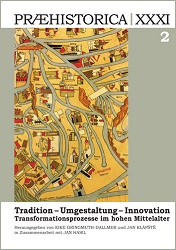Subsistenzwirtschaft – Vergetreidung – Dörfer. Schritte auf dem Weg zur hochmittelalterlichen Kulturlandschaft in Ostmitteleuropa
Subsistence Economy – Cerealisation – Villages. Stages in the Creation of the High Medieval Cultural Landscape in East Central Europe
Author(s): Matthias HardtSubject(s): Cultural history, Agriculture, Economic history, Social history, Rural and urban sociology, Economic development, 6th to 12th Centuries
Published by: Univerzita Karlova v Praze, Nakladatelství Karolinum
Keywords: Slavs; Self-sufficiency; Settlement expansion; Cerealisation; Settlement nucleation;
Summary/Abstract: The development of the High Medieval cultural landscape significantly changed the structure and environment of the Slavic settlements in East Central Europe. Up to the mid-12th century, small, largely unstructured settlements existed close to the many bodies of water and engaged in a subsistence economy geared towards self-sufficiency and based on farming and livestock herding. After the arrival of immigrants from the West, and in co-operation with the autochthonous population, agricultural areas were significantly expanded and prepared for large-scale cereal cultivation. In this context, large villages also emerged, either grouped around village greens (Angerdorf), in rows along streets (Straßendorf) and along roads or streams through forests (Waldhufendorf; Hagenhufendorf). Their fields were organised according to the demands of three-field crop rotation. Water mills were built in order to process the crops for sale in urban markets, also developing at this time, which led to a rise in the water table of rivers and lakes and thereby significantly impacted on the natural environments of the earlier, water-oriented settlements. Their inhabitants moved into the new villages, where they assimilated to the immigrants and lost their Slavic language and identity, but possibly achieved a higher quality of life through an improved legal status and increased food production.
Journal: Praehistorica
- Issue Year: 31/2013
- Issue No: 2
- Page Range: 569-583
- Page Count: 15
- Language: German

